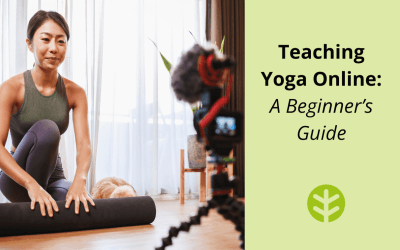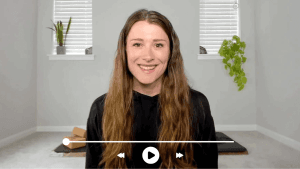Lighting up your online classes can be tricky, and there is more to be aware of than the average online teacher probably realizes.
We recently spoke with photographer, filmmaker, and experienced online yoga teacher Kristi Adams about all of her tips for creating a great online class, and this article is number three in the series that shares the stack of wonderful tips Kristi gave us (you can find the other articles linked at the bottom of this post).
Lighting Know-How
Just like your audio and your camera angle, your lighting setup has some nuances to be aware of, and how you light your space for your shot is crucial.
Good lighting is key for the clarity of your shot because movement uses more memory, so the more you move, the harder a camera has to work to create the image. Being well-lit improves the algorithms and gives a better overall image.
Natural light is often your best option, but it can be tricky to get enough of it at the right angle, and we have so little control over it. The natural light should usually be either behind or to the side of your camera – if it is behind you, you will likely become a shadow (unless you also have a really good indoor lighting system shining from the front). You could try moving your class outdoors, but that has its hazards – local noise, wind, rain, too cold (or too hot!) – and a lot depends on the time of day and the angle of the light in order for it to be really effective.
Indoor lighting systems can be also great, but they are often expensive. So before you invest in a professional soft lighting system, read on for some other tips you could try first, including learning how to effectively combine natural light with indoor light.
Color Temperature
Have you ever switched an indoor light, thinking it would help light your space on camera, but instead, it changes the color tone or even darkens the shot? That is your color temperature – when we offer both natural light and non-natural light, the camera has to choose which color temperature to go with, and this can result in skewed lighting.
So if you have natural light in your space and want to boost it, choose a daylight bulb for your indoor system to make sure the temperatures blend well together.
Budget-Friendly Lighting Tips
- Don’t bust the budget with a professional soft lighting system right off the bat. Head to a hardware store, grab a clamp lamp, and buy a daylight bulb for it. This can be a great quick (and cheap) fix for your lighting.
- Reflected light can be another easy way to improve your lighting situation, either by using a reflector to catch natural light and bounce it back or even a sheet of cardboard painted white.
- If you have a white wall behind you, you can catch the reflection from that and send it back. This trick can even out the light and fill in dark areas.
- Using diffusion softens the light, which is easier for both the camera and the viewer. Drafting vellum is widely available and inexpensive, and you can drape it over windows to soften and diffuse the incoming light.
- Experiment, and be aware that you can only see the difference on camera if there is actually a person in the shot, so teaming up with a colleague or friend to give feedback on your online class is a very good idea. Sometimes moving your lighting by just a couple of inches can make a big difference.
OfferingTree integrates with Zoom to make setting up your online classes much easier. If you are recording your online classes, you can upload them to your OfferingTree website to share them with your users and even add them to a membership. To learn more about setting up an OfferingTree website.

Kristi Adams is a photographer, filmmaker, and Yoga teacher based in the San Francisco Bay Area. Kristi combines her work as a yoga teacher with her career in filmmaking to consult with yoga teachers and yoga studios to perfect their online offerings.








